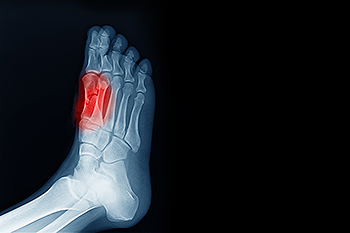283 St Rose Ave
Windsor, ON N8S 1X1
 Sesamoiditis is an inflammation of the sesamoid bones, two tiny bones beneath the big toe joint. These bones are embedded within the tendons that allow the big toe to move. Sesamoiditis typically occurs from overuse or repetitive stress, making it common among athletes and dancers. Symptoms of sesamoiditis include pain in the ball of the foot, especially when walking or running, and swelling or bruising in the area around the big toe. The pain might worsen when the big toe is used, such as when pushing off to jump or take a step. Bending and straightening the big toe may also become difficult. If you have a painful big toe or ball of the foot, it is suggested that you consult a podiatrist for a proper diagnosis and treatment plan.
Sesamoiditis is an inflammation of the sesamoid bones, two tiny bones beneath the big toe joint. These bones are embedded within the tendons that allow the big toe to move. Sesamoiditis typically occurs from overuse or repetitive stress, making it common among athletes and dancers. Symptoms of sesamoiditis include pain in the ball of the foot, especially when walking or running, and swelling or bruising in the area around the big toe. The pain might worsen when the big toe is used, such as when pushing off to jump or take a step. Bending and straightening the big toe may also become difficult. If you have a painful big toe or ball of the foot, it is suggested that you consult a podiatrist for a proper diagnosis and treatment plan.
Sesamoiditis is an unpleasant foot condition characterized by pain in the balls of the feet. If you think you’re struggling with sesamoiditis, contact the practitioners of Foot Care Institute. Our practitioners will treat your condition thoroughly and effectively.
Sesamoiditis
Sesamoiditis is a condition of the foot that affects the ball of the foot. It is more common in younger people than it is in older people. It can also occur with people who have begun a new exercise program, since their bodies are adjusting to the new physical regimen. Pain may also be caused by the inflammation of tendons surrounding the bones. It is important to seek treatment in its early stages because if you ignore the pain, this condition can lead to more serious problems such as severe irritation and bone fractures.
Causes of Sesamoiditis
- Sudden increase in activity
- Increase in physically strenuous movement without a proper warm up or build up
- Foot structure: those who have smaller, bonier feet or those with a high arch may be more susceptible
Treatment for sesamoiditis is non-invasive and simple. Doctors may recommend a strict rest period where the patient forgoes most physical activity. This will help give the patient time to heal their feet through limited activity. For serious cases, it is best to speak with your doctor to determine a treatment option that will help your specific needs.
If you have any questions please feel free to contact our office located in Windsor, ON . We offer the newest diagnostic and treatment technologies for all your foot and ankle needs.

Foot tendon pain, often termed tendonitis, can arise from various causes. Tendons are essential for foot function because they connect muscles to the foot's many bones and support daily activities like walking and running. Common causes of foot tendon injury include wearing ill-fitting footwear, sudden foot movements, repetitive stress from activities like sports, and trauma. Structural issues, such as flat feet or high arches, can predispose individuals to tendon problems. Age-related degeneration and medical conditions, like diabetes and rheumatoid arthritis, are other contributing factors to foot tendon pain. Obesity increases the risk of tendonitis due to increased pressure on the feet. Also, overuse, weak muscles, and loose ligaments can contribute. Understanding these factors helps individuals to take proactive steps to safeguard their foot health. If you are experiencing persistent foot tendon pain or discomfort, it is suggested that you schedule an appointment with a podiatrist for a comprehensive evaluation and diagnosis, followed by a personalized treatment plan.
Foot Pain
Foot pain can be extremely painful and debilitating. If you have a foot pain, consult with the practitioners from Foot Care Institute. Our practitioners will assess your condition and provide you with quality foot and ankle treatment.
Causes
Foot pain is a very broad condition that could be caused by one or more ailments. The most common include:
- Bunions
- Hammertoes
- Plantar Fasciitis
- Bone Spurs
- Corns
- Tarsal Tunnel Syndrome
- Ingrown Toenails
- Arthritis (such as Gout, Rheumatoid, and Osteoarthritis)
- Flat Feet
- Injury (from stress fractures, broken toe, foot, ankle, Achilles tendon ruptures, and sprains)
- And more
Diagnosis
To figure out the cause of foot pain, podiatrists utilize several different methods. This can range from simple visual inspections and sensation tests to X-rays and MRI scans. Prior medical history, family medical history, and any recent physical traumatic events will all be taken into consideration for a proper diagnosis.
Treatment
Treatment depends upon the cause of the foot pain. Whether it is resting, staying off the foot, or having surgery; podiatrists have a number of treatment options available for foot pain.
If you have any questions, please feel free to contact our office located in Windsor, ON . We offer the newest diagnostic and treatment technologies for all your foot care needs.

Strengthening your ankle ligaments is essential for preventing sprains and enhancing stability, especially if you are active in sports or physical activities. Simple ankle exercises include pointing and flexing your toes and performing heel raises while focusing on controlled movements. Other simple, but effective, ankle strengthening exercises include partial knee squats, either against a wall or with a chair for support, and incorporating stair climbing into your workout routine. These exercises help build strength and stability in your ankles, reducing the risk of sprains and enhancing overall mobility. However, it is suggested that you consult with a podiatrist before starting any ankle exercise regimen, particularly if you have existing ankle joint issues or are experiencing ankle pain. For personalized exercise recommendations and treatments to address your ankle instability or weakness, it is suggested that you schedule an appointment with a podiatrist.
Exercising your feet regularly with the proper foot wear is a great way to prevent injuries and build strength. If you have any concerns about your feet, contact the practitioners from Foot Care Institute. Our practitioners can provide the care you need to keep you pain-free and on your feet.
Exercise for Your Feet
Exercise for your feet can help you gain strength, mobility and flexibility in your feet. They say that strengthening your feet can be just as rewarding as strengthening another part of the body. Your feet are very important, and we often forget about them in our daily tasks. But it is because of our feet that are we able to get going and do what we need to. For those of us fortunate enough to not have any foot problems, it is an important gesture to take care of them to ensure good health in the long run.
Some foot health exercises can include ankle pumps, tip-toeing, toe rises, lifting off the floor doing reps and sets, and flexing the toes. It is best to speak with Our practitioners to determine an appropriate regimen for your needs. Everyone’s needs and bodies are different, and the activities required to maintain strength in the feet vary from individual to individual.
Once you get into a routine of doing regular exercise, you may notice a difference in your feet and how strong they may become.
If you have any questions please feel free to contact our office located in Windsor, ON . We offer the newest diagnostic and treatment technologies for all your foot and ankle needs.







